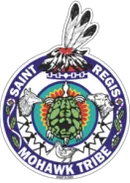In the late-1970s, the discovery of widespread environmental contamination from local industry spurred the need for greater tribal participation in the clean-up of waste sites and management of active pollution sources. The exposure effects of local industrial pollution had far-reaching implications for public health and tribal use of natural resources. Those early staff laid the ground work for what became the Environment Division.
Today, the Environment Division provides a wide range of professional opportunities where staff work to restore traditional practices, improve the safe use and enjoyment of natural resources and ensure sustainability for future generations. The Environment Division includes six programs that oversee multiple regulatory authorities that play an essential role in self-governance of the Saint Regis Mohawk Tribe.
Agriculture Program
Supporting sustainable agriculture through farming education, community outreach, and services. The Agriculture Program provides assistance to community members who are looking to increase local production of farm products. This is accomplished through workshops, evaluating different production methods, and direct assistance to growers.
Services & Programs offered:
Market Garden Produce | Mother Earth Eggs | Mother Earth Pig Shares or Meat Packages | Services We Offer | White Corn
Air Quality Program
Providing the community with access to technology and data to reduce the impacts of harmful air quality, both indoors and outdoors. The Air Quality Program specializes in monitoring a variety of harmful pollutants. Reducing the harm of exposure requires improved decision making and evaluating methods to reduce or eliminate exposure.
Further information:
Acid Rain Monitoring | Air Quality Reports, Links, and Other Data | Ambient Air Monitoring | Burn Permit | Climate Change | Indoor Air Quality Assessments | Lead Testing | Polychlorinated Biphenyls (PCB) | Radon Gas Testing | Vegetation and Fluoride
Land Resources
Promoting the sustainable protection and enhancement of land resources, while working to restore the reciprocal relationships that exist between the land and the Akwesasne Community. The Land Resources Program includes a forestry crew that actively manages black ash trees to support traditional basketry, and pest response for impacts from the invasive emerald ash borer. The program operates a plant nursery that support restoration of native trees and shrubs. Lastly, the program administers the Tribe’s a pesticide and herbicide regulations.
Further information:
Forestry Resources | Invasive Species | Pollinator Protection | Native Plant Working Group Newsletter
Remediation and Restoration
Applying scientific methods and Indigenous Traditional Ecological Knowledge (TEK) to manage industrial chemical risks to human health, restore the environment, and restore traditional practices of the community of Akwesasne. The Remediation and Restoration Program provides oversight for the remediation of hazardous waste sites, removal of abandoned structures and cleanup of former commercial properties. The program specializes in post-cleanup restoration for native species including fish, freshwater mussels and medicinal plants. Learn more →
Further information:
Brownfields | Remedial Advisory Committee (RAC) Meetings | St. Lawrence River Area of Concern at Massena/Akwesasne | Superfund
Solid Waste Management
Ensuring the proper handling and disposal of solid wastes generated in Akwesasne. The Solid Waste Management Program operates a community Transfer Station where materials are sorted for recycling and disposal. They offer a range of commercial and residential solid waste services in Akwesasne. Learn more →
Further information:
Hazardous Materials | Management Practices | Recycling | Services & Fees | Solid Waste Management Resources | Transfer Station
Water Resources Program
Ensuring the safety and health of Tribal Waters by monitoring water quality, protecting aquatic habitats and monitoring native fish populations. The Water Resources Program provides the community with timely information on threats to water quality (i.e. swimming safety) and other the health of fish resources. The program oversees regulatory actions through wetlands protection, water quality standards and permitting.
Further information:
Fisheries | Hogansburg Dam Removal | River Health | Wetlands
InitiativesEnvironmental AssessmentsEnvironmental Assessments (EAs) and Environmental Reviews (ERs) have become an important planning and development tool for the Tribe because of increased development on the reservation. The format and structure for conducting EAs and ERs parallel that of the National Environmental Policy Act (NEPA) and are tailored to the uniqueness of the St. Regis Mohawk Tribe and Mohawk Culture. Learn more → St. Lawrence Environment Trustee CouncilA Trustee Council was formed to assess injuries and determine damages to the natural resources of the St. Lawrence Environment and develop a plan for restoration of these injured natural resources. The Trustee Council consists of the U.S. Fish and Wildlife Service (on behalf of the U.S. Department of the Interior (DOI), the New York State Department of Environmental Conservation (on behalf of the State of New York), the National Oceanic and Atmospheric Administration (on behalf of the U.S. Department of Commerce), and the Saint Regis Mohawk Tribe, Environment Division (together, the Trustees). Learn more → Further information: |
Connect With Us
Explore our community engagement platform to learn about our many projects, provide feedback, and see what others in the community are thinking about. Experience community empowerment on a digital level from the comfort of your home or on the go! Click "Connect With Us" to see more.
Contact Information:
Environment Division Office
Teionkwarihwaienawa:kon | Community Services Building
850 State Route 37, Akwesasne, NY 13655
Weekdays 8:00 am to 4:00 pm
Phone: 518-358-5937
Email us: environment@srmt-nsn.gov
Solid Waste Transfer Station
179 County Route 43, Fort Covington, NY
Monday, Tuesday, Wednesday, Friday and Saturday 7:30 a.m. to 2.45 p.m. (closed Thursdays)
Phone: (518) 358-4632, Fax: (518) 358-4529
Email the Solid Waste Team: transfer.station@srmt-nsn.gov

